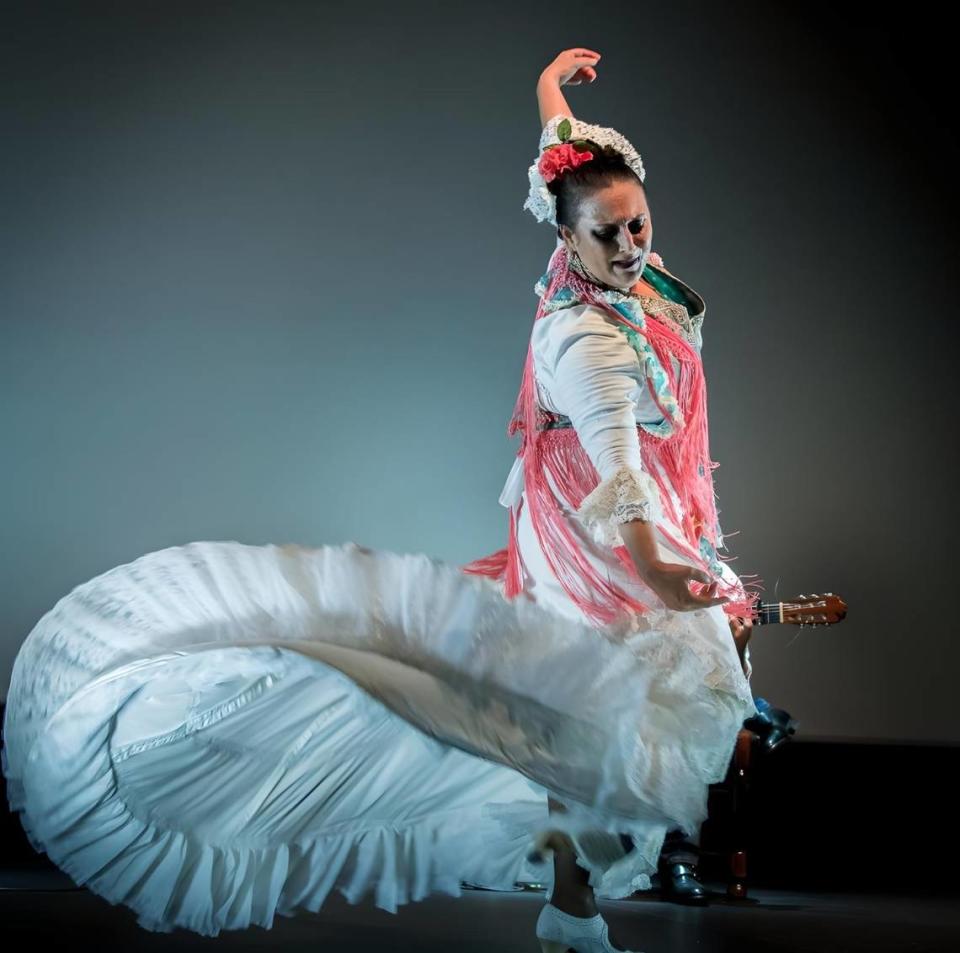This year’s Siempre Flamenco Festival de Cante is a family affair
It was 17 years ago when flamenco dancer Celia Fonta and her husband, guitarist Paco Fonta, organized the first Siempre Flamenco Festival de Cante Miami. Their mission was to present to Miami audiences the best dancers and musicians in traditional flamenco dance and music.
The festival grew out of the Fontas’ yearly trips to Andalucía, Spain’s southernmost region and the birthplace of flamenco, to visit Paco’s family and relatives in the town of Jaén where the musician learned flamenco singing and guitar from traditional musicians.
“Paco and I would travel every summer to visit his family and would attend many festivals in all the small towns nearby,” says Celia Fonte. “The festival was originally conceived and created to present a traditional singing festival like the ones we went to in Andalucía in the summer.”

The couple knew they wanted their festival to capture the magic of those small-town festivals that often presented five singers over a four-hour period. While they were aware that they had to tweak the format length to fit the attention spans of an American audience, their commitment to presenting traditional flamenco dance and music would not change.
Over the years, the festival has grown and its length has expanded from a single evening performance to four performances over three days at the Adrienne Arsht Center in Miami.
Celia Fonta says that the festival’s format has proven successful and has stayed the same.
First, there are three guest singers who perform a solo accompanied by a guitarist, then there is a guest dancer and then Celia dances. “… The opening and closing (is) where all artists participate.”
Newcomers to this year’s festival include flamenco vocalist, David El Galli, and singer Mari Peña. Peña heralds from the village of Utrera in the outskirts of Seville where she comes from a long line of famous Utreran flamenco vocalists.
“Her singing is very different from generic flamenco singing,” explains Celia Fonta. “(She) has a very particular style of marking the rhythms, and we have never had anyone from that region with us before.”

The flamenco tradition in music stretches back to when the Roma (originally Doma) migrated from Rajasthan and the Punjab in northern India between the 10th and 11th centuries. In the 13th and 14th centuries, the nomads arrived in Western Europe bringing their musical instruments – castanets, hand clapping, feet rhythms, drums – and their voices.
In Spain, many of those Romani families settled in the province of Andalusia at the Southernmost tip of Spain where their musical practices absorbed native Spanish, Moorish and Jewish influences. Europeans believed these arrivals were from Egypt and called them “gypsies.” The Spanish called them “Gitanos ” (from “Egiptano”).
Originally meant as a slur, the term “gypsy singer” in flamenco has come to describe a prized quality and unique style in a singer’s voice. It also locates the vocalists as someone who traces their origins to families that settled in the chain of little Spanish towns linking Cadiz to Seville.
“A lot of flamenco shows a lot of influence from many of these families,” says Celia. “Not every singer comes from one of these important families from a town with 200 years of flamenco singing in their family. There are several important musical families in Andalucía, and she (Mari Peña) comes from an important one Utrera.”

Peña’s 2018 recording, “Mi tierra” (“My Land”), includes selections recorded with her husband, guitarist Antonio Moya, who will also be performing with her at the festival.
Born in France to a family of Andalusian immigrants, Moya has accompanied some of flamenco’s great singers including Bernarda de Utrera, Pepa de Benito, Gaspar de Utrera, Enrique el Extremeño and Tomás de Perrate, among others.
Dancer Susana Lupiañez, know as La Lupi, was invited after Paco Fonta performed with her last summer in Chicago at the Ensemble Español Spanish Dance Theater Festival sponsored by Northeastern Illinois University.
Celia Fonta says it’s the close-knit creative work of the husband and wife team that makes them so exciting.

“Her husband (Curro de Maria) is a wonderful guitarist who writes all of their music. La Lupi adds the choreography to his composition,” says Fonta. “It is a collaborative process between the two of them.”
When asked about the three husband and wife pairings (which include Celia and Paco Fonta) that fill out this year’s program, Celia says: “It is pretty common in flamenco that you have a singer and a dancer or a guitarist pair off together.”
This year’s festival goes a step further and showcases the family roots of the flamenco art form. Peña and Moya’s 20-year-old daughter, Mañuela Moya – an up-and-coming flamenco vocalist in her own right – will also perform as part of her parents’ festival set.
If you go:
WHAT: Siempre Flamenco’s 17th Annual Festival de Cante Miami
WHERE: Carnival Studio Theater, Adrienne Arsht Center for the Performing Arts, 1300 Biscayne Blvd., Miami.
WHEN: 8 p.m. Friday, Sept, 15, 3 and 8 p.m. Saturday, Sept. 16, and 4 p.m. Sunday, Sept. 17.
COST: $50-$68.
INFORMATION: 305-949-6722 or arshtcenter.org
ArtburstMiami.com is a nonprofit media source for the arts featuring fresh and original stories by writers dedicated to theater, dance, visual arts, film, music and more. Don’t miss a story at www.artburstmiami.com.

